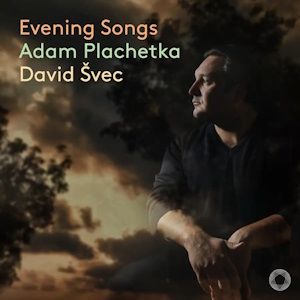
Evening Songs
Contents listed after review
Adam Plachetka (bass-baritone)
David Švec (piano)
rec. 2024, Rudolfinum, Prague
Czech texts and English translations included
Pentatone PTC5187219 [45]
Adam Plachetka has already recorded three important Dvořák song cycles for Radioservis as well as his cantata The Spectre’s Bride in 2016. The Czech bass-baritone is an admired singer on the operatic stage, principally of Mozart, though my last encounter arose when he came in as a late replacement to sing in Handel’s Theodora. Here he’s back in his native language with Czech song cycles, and individual songs, that bear the title ‘Evening Songs’. It’s released to celebrate the ‘Year of Czech Music’.
Though he was a prolific song composer, the genesis of a number of Dvořák’s works for the voice is uncertain. The ‘Evening Songs’ (or Večerní písně) were not even necessarily intended to be cycles, though that’s how they are often performed today. At any rate, they are amongst his earliest works to have achieved recognition. The Op.3 songs, composed in 1876 and revised in 1881, are representative of the sets that follow in that, despite the possible implications of the title, they are not nocturnes in the artistic meaning – there’s no sense in which these sets are merely crepuscular. On the contrary, the reflective elements take their place alongside more avuncular and self-confident songs. The Op.3 set is nicely balanced in this way and Plachetka shows he can use his powerful bass-baritone with as much refined nicety as extrovert trumpeting.
The two Op.9 songs are complex in their way, the first coursing with exultant vigour, the second animated by charging piano rhythms conveyed with real brio by David Švec, who proves an excellent partner throughout. The five Op.31 songs repeat these successful elements of the earlier Op.9 set – the dramatic small-scaled scena, the animation and aliveness of the piano writing, with the rolled chords in the fourth song, adding to the cycle’s tension. Allied to which, there are small moments of deep gravity and introspection, which Dvořák then happily subverts in the verdant final song of the set.
Smetana’s ‘Evening Songs’, though composed at the same time as his compatriot’s, are late works. His 1879 settings came five years before his death but they sound, notwithstanding that fact, altogether more old fashioned than Dvořák’s, simpler too, and with less independence in the piano writing. Despite this, they’re not without interest in Smetana’s use of folkloric material – the fourth song sounds like folkloric pop music, late nineteenth-century style. The use of such material is another point of difference with Dvořák who doesn’t utilise folklore in any of his ‘Evening Songs’. More frank, more unbuttoned and less ambiguous, Smetana’s songs are entertaining examples of his art not least in the final one where the piano is wittily converted into a quasi-orchestra.
Fibich’s brief songs are romantically inclined, relatively atmospheric and varied. Sometimes he can be very inflexible – setting one note per word – but at other times he is more fluid, more ardent and open-hearted. He writes a persuasive love lullaby which Plachetka sings with sure ardour, and a spry faster song or two. There’s also one song by Suk though it doesn’t really represent him at his best.
The poet who unifies all these settings is Vitězslav Hálek and his texts are duly reproduced in the booklet alongside translations in English and pertinent notes from Michael Beckerman. I suspect that for most readers, these songs will be largely unfamiliar so it’s to the good that they’ve been recorded with such conviction in the Rudolfinum.
You’d be hard pressed to find a similar disc, even at only 45 minutes in length. The Slovak tenor Pavol Breslik has recorded Op.31 and the familiar Gypsy songs and Beno Blachut heads the historic performances with his recording of Opp. 3 and 9, adding the Love Songs, Op.83. No one, though, to my knowledge, stands in direct competition with Plachetka and Švec.
Jonathan Woolf
Buying this recording via a link below generates revenue for MWI, which helps the site remain free



Contents
Antonín Dvořák (1841-1904)
Evening Songs, Op.3 (1876 rev 1881)
Evening Songs; Just Like the Moon (no op.)
Evening Songs, Op.9 (1879/1880)
Evening Songs, Op.31 (1882)
Bedřich Smetana (1824-1884)
Evening Songs, BJ 1:116 (1879)
Zdeněk Fibich (1850-1900)
5 Songs from Evening Songs, Op.5 (1871)
Josef Suk (1874-1935)
The Night was Beautiful

















